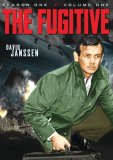| Reviews & Columns |
|
Reviews DVD TV on DVD Blu-ray 4K UHD International DVDs In Theaters Reviews by Studio Video Games Features Collector Series DVDs Easter Egg Database Interviews DVD Talk Radio Feature Articles Columns Anime Talk DVD Savant Horror DVDs The M.O.D. Squad Art House HD Talk Silent DVD
|
DVD Talk Forum |
|
|
| Resources |
|
DVD Price Search Customer Service #'s RCE Info Links |
|
Columns
|
|
|
Fugitive - Season One, Volume One, The
September 17, 1963: The day the running started.
Name: Richard Kimble. Profession: doctor of medicine. Destination: death row, state prison. Richard Kimble has been tried and convicted for the murder of his wife. But laws are made by men, carried out by men. And men are imperfect.
Richard Kimble is innocent.
Proved guilty, what Richard Kimble could not prove was that moments before discovering his wife's body, he encountered a man running from the vicinity of his home. A man with one arm. A man who has not yet been found.
Richard Kimble ponders his fate as he looks at the world for the last time. And sees only darkness.
But in that darkness, Fate moves its huge hand.
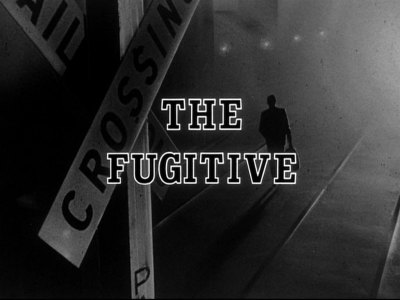
The Fugitive, one of television's greatest drama anthologies, has finally come to DVD. Released in a questionable split-season set, with zero extras and a warning that some of the episodes' music and content may have been changed from their original format, the strength of the series far outweighs these drawbacks, making this 4-disc, 15 episode set one of the year's best releases.
Just a little more than two months before the assassination of President John Kennedy, when America was plunged into a national state of mourning and many citizens felt a perceptible loss of innocence in their viewpoints on our culture and in their own daily lives, ABC premiered The Fugitive, a prescience, nightmarish vision of the American landscape. Coming after Kerouac's On the Road, and ending two years before Hopper's Easy Rider, The Fugitive looked at "the road," that multi-million mile ribbon of highways and streets that always seemed to promise freedom, prosperity and hope in our popular culture, and instead showed it to be a frightening, endless maze of paranoia, mistrust, treachery, and utter loneliness.
Created by Roy Huggins (Maverick, The Rockford Files), and produced by TV legend Quinn Martin (The F.B.I., The Streets of San Francisco, Barnaby Jones), The Fugitive starred David Janssen as Dr. Richard Kimble, a Stafford, Indiana pediatrician falsely convicted of murdering his wife, with whom he had a stormy marriage. Unable to convince anyone that he did indeed see a wild-eyed, one-armed man running from the vicinity of his house, Kimble is sentenced to be executed at the Indiana State Prison. Handcuffed to police Lieutenant Philip Gerard (Barry Morse), the train carrying Kimble to the death house, by a twist of fate, jumps the track, and Kimble escapes. Hunted now by the relentless Lt. Gerard, who feels Kimble's fugitive status is a blot on the justice system (but who also, it is hinted, may feel Kimble is indeed innocent), Kimble must constantly remain on the run, dodging various local sheriffs and state police, as well as Lt. Gerard, as he searches desperately for the mysterious one-armed man who he believes killed his wife.
An existential nightmare set down in the middle of a mythical TV Land's relentlessly happy "golden age," where shows like The Dick Van Dyke Show, The Andy Griffith Show, The Donna Reed Show and The Adventures of Ozzie and Harriet ruled the Nielsen ratings' roost (TV's iconic Father Knows Best and Leave it to Beaver had just ended their runs the previous season), the quietly subversive view of America presented by The Fugitive struck a chord with audiences who may have been looking at their own America a little bit differently by 1963. Obviously lifted from Victor Hugo's Les Miserables, and filtered through the horror of the recent (1954) and still notorious Dr. Sam Sheppard murder case (a fact creator Huggins finally admitted to after years of denying that source), The Fugitive presented a vision of America rarely seen on national network TV. While many if not most of the episodes had Kimble, decked out with a new alias and working at some menial, anonymous job, meeting all sorts of people who were willing to help him out, the mere fact that he was constantly on the run in an America that looked unfamiliar to him, and in which he could find absolutely no solace during his tormented journey, was a startling departure for American television.
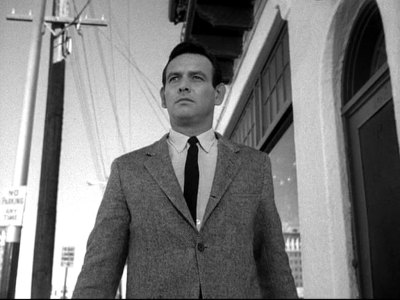
As well, The Fugitive presented the notion that many Americans actually worked for a living - to stay anonymous, Kimble takes the lowest jobs available, where identification isn't necessary or asked for - and that they worked hard for relative scraps. Over on high-rated classic, The Adventures of Ozzie and Harriet nobody even knew what the hell Ozzie did for a living; he always just hung around the house (and delightfully so, I might add). Here, American TV viewers were reminded, perhaps for the first time in a highly successful series, that there was another America out there, and one not so clean and tidy, and as financially successful, as the Nelson's (series like The Honeymooners frequently made jokes about limited finances; rarely were dramatic series looking at poverty in America).
Further presenting the viewer with a potentially altered view of the American Dream was the fact that Kimble was a doctor. With today's myriad malpractice lawsuits and a general feeling of anxiety with our health care system, it's difficult to remember the degree of esteem in which doctors were held by the public during the early 1960s. The fact that the American justice system, routinely championed during this time period on American television (Dragnet would be the most obvious example), could wrongly convict a doctor for murder was quite novel for television at this time. After all, most viewers probably wondered, if it could happen to a doctor, it could certainly happen to me. The Fugitive definitely trades on this social class distinction. Dr. Kimble's travails are made to seem more poignant, more unjust, precisely because he is a member of a higher social class at that time (brilliantly countered by Huggins, so as to increase audience sympathy, by having him be a pediatrician - helping children, which seems more selfless - and by having him come from Middle America Indiana - he's no snob). After all, isn't it always Kimble's solid, polite, Middle American good manners and generally educated air, that always trips him up with people not expecting such behavior in the menial jobs he's reduced to taking?
Certainly the show's drawbacks (or shall we say "romanticisms," since those "drawbacks" only add to the enormous appeal of the show) are inherent in this dichotomy, as well. Never have isolation and dread been made to seem more desirable; nor has working in dead-end jobs looked so good as they do in The Fugitive. Why, you may ask? Well, because if you're handsome, polite, charming David Janssen, you're going to invariably meet some gorgeous woman who falls in love with you. Most episodes involve Kimble attracting the attention of a beautiful, usually lonely or misunderstood woman, who comes alive when presented with the mysterious, obviously emotionally wounded - and desirably unattainable - Kimble. Kimble is always shown battling his resolve to remain uninvolved with the people he meets (usually stated in an episode's evocative, beguiling narration, performed by TV legend, William Conrad), only to see that resolve crumble when presented with a problem that his solid Midwestern values (always help children and women in distress, regardless of personal danger) or his inherent nurturing characteristics (he is a doctor, after all) will not let him ignore.
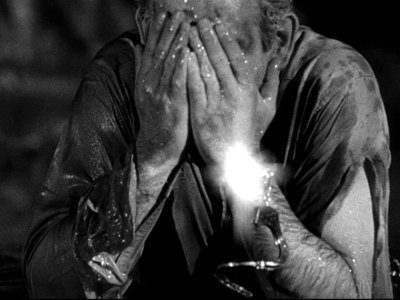
It doesn't hurt Kimble's scoring record that he's also probably the best-dressed itinerant fugitive ever to hit the American bricks. Nattily attired in a nicely fitted tweed sport coat and pressed chinos, or rugged, cool action wear for his more physical labors (I would kill for a pair of those chukka boots he's always wearing), Kimble can't help but get noticed by the ladies - as well as the police. Although the series consistently makes its case - and makes it well - that Kimble is tortured, that he is still grieving for his wife, that he is increasingly burnt out by the running, the suspicions, the paranoia, I would suspect part of the appeal of the show was the secret desire we all have to live this kind of lifestyle. The notion of "dropping out" would soon become prevalent in America, but to those viewers of The Fugitive who thought, "Hey, this might be kind of fun, leaving behind the spouse, taking myself wherever the road might lead me - especially if it's to a good-looking someone new, why not?" the series beautifully made the case, episode after episode, that Kimble wanted nothing more than to resume his identity and return home to his family.
Janssen, a moderately successful second lead and contract player over at Universal, first scored some serious attention with the well-received TV series, Richard Diamond, Private Detective which ran for three years on NBC. But he will forever be associated most closely with The Fugitive. It's a case of an almost perfect mesh between actor, character and medium. Janssen, who after starring in the phenomenally successful The Fugitive, couldn't quite translate that fame to the big screen, despite some high profile roles. He was always best suited for the small screen, and here, his perfectly realized Dr. Kimble is a marvel of suppressed fear and outward wariness and resignation. Janssen, playing a big part of the role with his head down (almost unheard of for actors who want to be seen), limits his choices to slight grimaces, shrugs, and cut-off sentences that are nicely pitched by his deep, grumbling voice (he's like a Glenn Ford that you actually believe is acting).And he's ably assisted by some of the best actors in the business. I've listed the supporting players that show up in The Fugitive: Season One, Volume One in the individual episode descriptions, but they play out like a who's who of the best actors from that time period. Special mention should be made, as well, about Barry Morse, playing the relentless, unstoppable Lt. Gerard. Morse, with his sharp, angular features, brings just the right amount of barely suppressed fanaticism to the character, while always carefully letting the audience in on the fact that Gerard, although he basically believes Kimble's story, will never stop pursuing him because that's the letter and spirit of the law - a law that the series time and time again questions. As for the look of The Fugitive, it's notable for the extensive use of location shooting, often times in real bus stations, gas stations, courthouses, stores and other mundane place that enhances the verisimilitude of the series (along with the often-times beautiful chiaroscuro black and white cinematography, furthering the series' noir feeling).
The Fugitive may have indeed made concessions to the network TV anthology drama genre, by having numerous romantic interludes for Kimble, and by never showing him physically suffering too greatly. And it was rewarded for these compromises by having big ratings (unrelenting, unforgiving grimness, isolation, and depression never works on a popular scale on American television). Premiering in 1963, The Fugitive benefited from its strong Tuesday night line up that included hit McHale's Navy, and soon-to-be big hits, Combat and Peyton Place (this line-up would catapult The Fugitive to number five in the Nielsen's for its sophomore season - its highest rating). It immediately found favor with audiences receptive to its combination of existential searching along with more traditional adventure and romantic elements; it finished up 28th for the year, with The Fugitive being one of only six ABC shows to make it into the Nielsen Top Thirty.
Despite these concessions to the traditions of network TV dramas, The Fugitive offered a view of America startlingly different than presented before on American TV, with an "anti-hero" loner who really wasn't "anti" anything. He was just like you and me, and he was being crushed by a blinded, misguided system, and a largely indifferent society. Despite the cool clothes and the good-looking women, drifter fugitive Dr. Richard Kimble was a model of fear, restlessness, and a deep, abiding loneliness that no viewer in their right mind would really want to emulate.
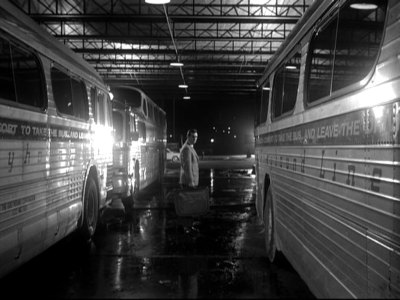
Here are the 15, one-hour episodes of the four-disc box set The Fugitive: Season One, Volume One, as described on its insert. PLEASE NOTE: As with most vintage TV series released by CBS/Paramount, there is a small disclaimer (smaller than normal, actually, with no prominent border box for this one) at the back of the DVD slimcase that states, "Music has been changed for this home entertainment version. Some episodes may be edited from their original network versions." There is no further explanation of what cuts, if any, were made. Most of the episodes time out at around 51 and a half minutes, which is about right or close for the original network run times. It's possible, though, that these are the syndicated versions, which may account for the minor cuts for time. Edited TV shows are one of the hottest topics concerning DVD releases, and as a reviewer, I've taken both sides of the issue, depending on what title I'm reviewing. It's usually a case-by-case basis. Here, with The Fugitive: Season One, Volume One, the show is so brilliant, and the fact that most of the run times seem close if not complete, prompts my favorable rating. I've included run times and guest stars for all the episodes, as well as, just for fun, all of Kimble's aliases, occupations, and the various episode locations, for all you Fugitive fanatics out there (of which I count myself):
DISC ONE
Fear in a Desert City (50:50)
Alias: James Lincoln.
Occupation: Bartender.
Location: Tuscon, Arizona.
Guest Stars: Brian Keith, Vera Miles, Harry Townes.
Breaking free of Gerard's custody, Kimble escapes to Tuscon, Arizona - where he befriends an attractive piano player with a jealous husband.
The Witch (51:21)
Alias: Jim Fowler.
Occupation: Delivery driver for feed store.
Location: Hainsville, Missouri.
Guest Stars: Patricia Crowley, Madeleine Sherwood, Arch Johnson, Gina Gillespie.
When a "bad seed" in a backwater Missouri town spreads lies about Kimble and a local teacher, Kimble must flee the state.
The Other Side of the Mountain (51:24)
Alias: "Mister."
Occupation: No occupation - on the run.
Location: an unnamed area in West Virginia.
Guest Stars: Sandy Dennis, Frank Sutton, R. G. Armstrong, Ruth White.
A West Virginia girl who fancies Kimble promises to lead him to safety - if she can come along.
DISC TWO
Never Wave Goodbye (Pt. 1) (51:12)
Alias: Jeff Cooper.
Occupation: Sail maker.
Location: Santa Barbara, California.
Guest Stars: Susan Oliver, Robert Duvall, Lee Philips, Will Kuluva.
Kimble falls for a California girl whose dying father hopes they'll remain a couple - but her brother has other ideas.
Never Wave Goodbye (Pt. 2) (51:22)
Alias: Jeff Cooper.
Occupation: Sail maker.
Location: Santa Barbara, California.
Guest Stars: Susan Oliver, Robert Duvall, Lee Philips, Will Kuluva.
When Gerard shows up in Santa Barbara, California, Kimble and his girlfriend fake their deaths at sea.
Decision in the Ring (51:24)
Alias: Ray Miller.
Occupation: Towel boy and cut man for boxer.
Location: Los Angeles, California.
Guest Stars: James Edwards, Ruby Dee, James Dunn.
While working as a "cut man" for a boxer whose manager might have mob ties, Kimble is implicated in a criminal investigation.
Smoke Screen (51:23)
Alias: Joseph Walker.
Occupation: Farm hand, volunteer fire fighter.
Location: Imperial Valley, California.
Guest Stars: Beverly Garland, Alejandro Rey, Pina Pellier.
Employed as a farm hand, Kimble risks blowing his cover when he assists a female worker who goes into labor.
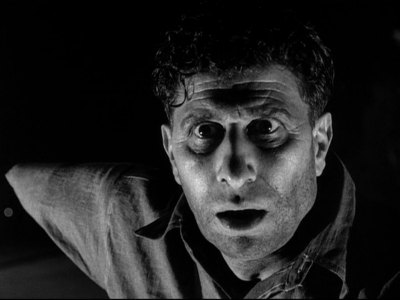
DISC THREE
See Hollywood and Die (51:14)
Alias: Al Fleming.
Occupation: Mechanic.
Location: Sierra Point, New Mexico.
Guest Stars: Brenda Vaccaro, Chris Robinson, Lou Antonio, J. Pat O'Malley.
At a filling station in New Mexico, Kimble and a female customer are taken hostage by a pair of dangerous thugs.
Ticket to Alaska (51:24)
Alias: Larry Talman.
Occupation: Lumberjack.
Location: Six miles off the coast of Seattle, Washington; Alaska.
Guest Stars: Geraldine Brooks, Murray Matheson, John Larkin, David White.
An FBI agent is murdered on a freighter sailing to Alaska - and Kimble is the prime suspect when his fake papers are discovered.
Fatso (51:24)
Alias: Bill Carter.
Occupation: No occupation - on the run.
Location: Pikesville and Ellsmore, Kentucky.
Guest Stars: Jack Weston, Bart Brinkerhoff, Glenda Farrell.
After a car accident in Kentucky lands Kimble in jail, he and his cellmate escape, which puts Gerard right on his tail.
Nightmare at Northoak (51:23)
Alias: George Porter.
Occupation: Lumberjack.
Location: Northoak, in an unnamed state.
Guest Stars: Nancy Wickwire, Frank Overton, Paul Carr.
Kimble rescues some children from a fire and his act of bravery makes the national news.
DISC FOUR
Glass Tightrope (51:13)
Alias: Harry Carson.
Occupation: Department store driver, stocker.
Location: Sioux City, Iowa.
Guest Stars: Leslie Nielsen, Edward Binns, Diana Van der Vlis.
When Kimble witnesses his department store boss accidentally kill a man, he makes anonymous phone calls to get him to confess.
Terror at High Point (51:22)
Alias: Paul Beaumont.
Occupation: Time keeper for construction crew.
Location: Salt Lake City, Utah.
Guest Stars: Jack Klugman, Elizabeth Allen, James Best, Buck Taylor.
At a construction site in Utah, Kimble tries to protect a mentally challenged worker accused of sexual assault.
The Girl From Little Egypt (51:23)
Alias: George Browning.
Occupation: No occupation - on the run, hitchhiker.
Location: San Francisco, California.
Guest Stars: Pamela Tiffen, Ed Nelson, Diane Brewster.
When an accident in San Francisco hospitalizes Kimble, he experiences flashbacks of the event surrounding his wife's death.
Home is the Hunted (51:45)
Alias: No alias.
Occupation: No occupation - on the run.
Location: Stafford, Indiana.
Guest Stars: Andrew Prine, Jacqueline Scott, Robert Keith.
Risking his safety, Kimble returns home to Indiana after his father has a heart attack.
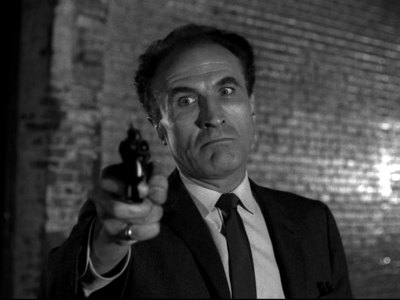
The DVD:
The Video:
The back of the DVD slimcase for The Fugitive: Season One, Volume One claims that these transfers were taken from the original negatives. They must be right, because the films look beautiful. Blacks are solid and velvety, and except for the expected grain and some scratches here and there, this is one of the sharpest looking transfers I've seen in awhile. Beautiful.
The Audio:
As well, the back of the box says restored audio. The Dolby Digital English mono mix accurately represents the original broadcast presentation, and is clear as a bell. Close-captioning is available.
The Extras:
Criminally, there are zero extras for this split-season set. That may be a deal breaker for potential buyers of the show.
Final Thoughts:
While I can't abide split season TV sets (it's a marketing ploy, pure and simple, to maximize profits for the releasing company), and I'm not thrilled about the possibility of editing, or the total lack of extras, the fact that The Fugitive: Season One, Volume One is such a masterpiece (and I almost never use that word), still makes this four-disc set highly recommended.
Paul Mavis is an internationally published film and television historian, a member of the Online Film Critics Society, and the author of The Espionage Filmography.


|
| Popular Reviews |
| Sponsored Links |
|
|
| Sponsored Links |
|
|
| Release List | Reviews | Shop | Newsletter | Forum | DVD Giveaways | Blu-Ray | Advertise |
|
Copyright 2024 DVDTalk.com All Rights Reserved. Legal Info, Privacy Policy, Terms of Use,
Manage Preferences,
Your Privacy Choices | |||||||









